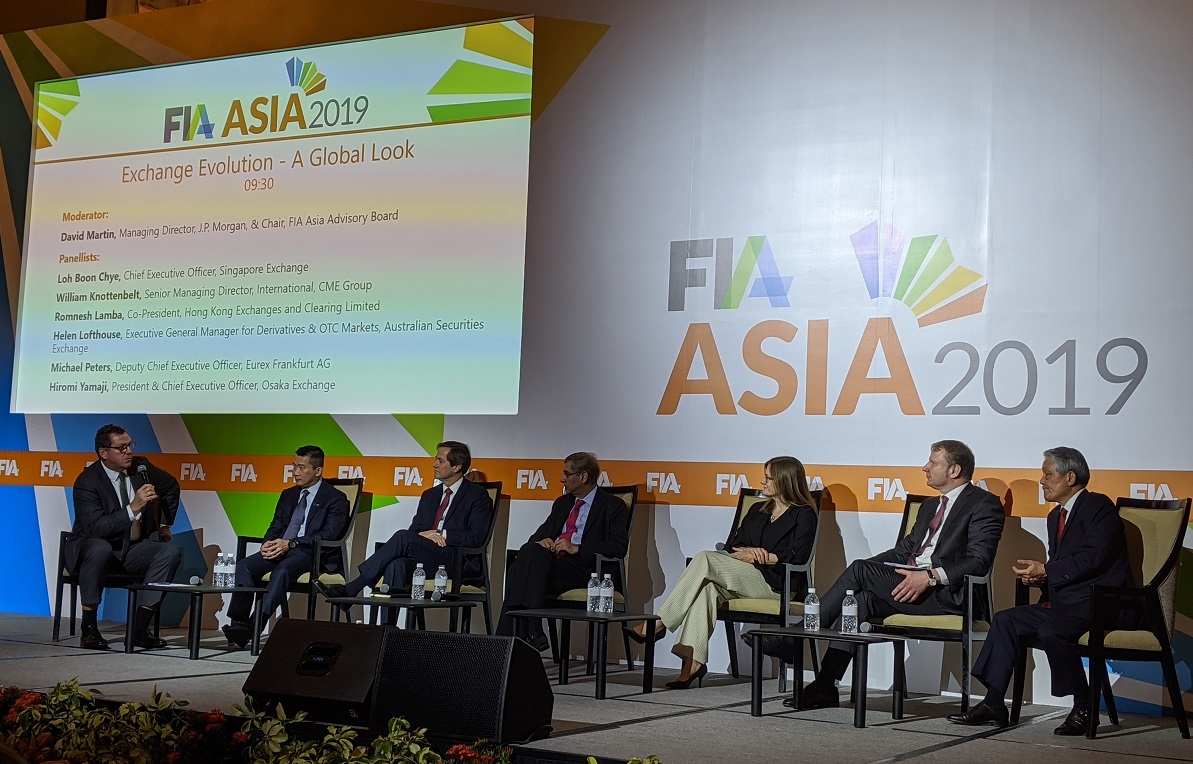Depending on who you ask, market data in the exchange industry is a hot topic, a hot commodity … or both. In a landscape where investors are leveraging data in innovative ways to guide investment decisions and exchanges are offering data sets to increase their revenue, how such data is curated and priced can be a complex conversation. To address trends in data and tackle other market-related topics, executives from leading global exchanges gathered at the 15th Annual Asia Derivatives Conference in Singapore on Wednesday to discuss the evolution of how exchanges operate in the markets.
Data has always been important in markets. Eurex Deputy CEO Michael Peters says data has powered a change in some of the basic interactions between exchanges and investors. Peters notes how Investors used to come to exchanges primarily for price discovery, but now they come for data. Such a shift has not gone unnoticed by exchanges, many of which now see data as a key revenue driver.
“Data is a critical “ingredient” of our business. It is a facilitator,” added Romnesh Lamba, co-president of Hong Kong Exchanges and Clearing.
Once exchanges transitioned from mutualized organizations to shareholder-owned companies, the push to explore additional revenue streams was seemingly inevitable, said JP Morgan Managing Director David Martin. But as the revenue exchanges see from market data becomes more significant, two concerns become very important for market participants: cost and trust.
CME Group Senior Managing Director William Knottenbelt believes it is important for investors who are reliant on data to remember fee increases put in place by exchanges are often driven by real costs associated with gathering the data, particularly the costs of acquiring specific data sets and meeting regulatory requirements. “Data is important, but our primary drive is managing risk,” added Knottenbelt.
With various exchanges competing to provide the best data, the panelists highlighted the importance of maintaining data integrity so investors can continue to trust the data. With a history of being a trusted meeting place for investors, Australian Securities Exchange Helen Lofthouse, Executive General Manager for Derivatives and OTC Markets Helen Lofthouse says exchanges are well-positioned to play a key role amid the rise of data. “There are many things in financial markets that need a trusted neutral party to run them. … Data is one of them.”
Hong Kong Unrest
Protests in Hong Kong have made headlines for months, but the protests have not caused any significant disruptions in the functioning of Hong Kong’s financial markets. Lambda from HKEx says that is not an accident. “Our focus has been to keep the market open. And we’ve managed that so far,” he explained.
When asked for his long-term outlook on the impact the protests will have on Hong Kong markets, Lamba used Brexit as a calming analogy. “I often compare Hong Kong to London. Brexit will have a major impact on the UK, but it won’t drive business away from the exchanges. The same is true of Hong Kong. Other sectors like tourism and retail have been hit, but the exchange business has remained strong.”
Concerns About Liquidity Quality
In remarks that kicked off the conference, Futures Industry Association President and CEO Walt Lukken noted the tremendous growth in the volume of contracts traded in the Asia-Pacific region. In fact, the number of contracts in the region is on pace to soon top the combined volume of North America and Europe. Digging deeper into those volume numbers, JP Morgan’s Martin expressed concern about the quality of liquidity in certain options markets.
CME Group’s Knottenbelt said one key to smoothing out liquidity concerns is to build out options volumes by region/time zone. “You have to make sure you have a 24-hour liquidity capability,” Knottenbelt said.
Market Structure Musings
Last year’s conference took place shortly after the default of a Nasdaq clearing member, so central counterparty resiliency was a “ripped from the headlines” hot topic. One year later, CCP resiliency and other market structure issues are still on the minds of exchange executives.
JP Morgan’s Martin was adamant about the role initial margin can play as the first line of defense against default. Martin said levels of initial margin should be set at appropriate levels, particularly in emerging markets.
Multiple executives cautioned against market structure changes that end up raising the barrier to entry for investors. The overarching concerns was that the costs of competing in the market climbs too high, investors will exit the market entirely.
ASX’s Lofthouse said one thing that makes market structure changes such a challenge is that the questions vary from product to product. That makes it difficult to implement changes that address issues across all markets.
Singapore Exchange CEO Loh Boon Chye said conversations about market structure reforms should never underestimate the importance of a sound and positive relationship between exchanges and Futures Commissions Merchants (FCMs).
